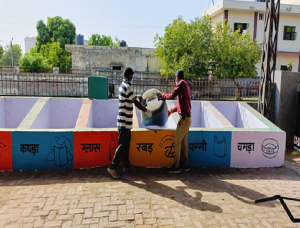CB Ambala: Material Recovery Facility (MRF) and RRR Initiatives By Cantonment Board

- Material Recovery Facility (MRF) The Material Recovery Facility (MRF) was established in 2024 by the Cantonment Board in Ambala Cantonment area. The MRF project involves a comprehensive waste management system focusing on effective waste segregation and utilization. The core components of the MRF project are:
- Door-to-Door Garbage Collection: Regular collection of waste from residential areas within the cantonment.
- Waste Segregation: Differentiating between wet (organic) and dry (inorganic) waste.
- Composting: Converting segregated wet waste into compost, which is then utilized as manure for plants and parks in the cantonment.
- Dry Waste Handling: Sorting dry waste manually to separate plastics, glass, and polythene for recycling and other utilizations.
- Reduce, Reuse, Recycle (RRR) Center Alongside the MRF, the Cantonment Board established the RRR Center in 2024 to support sustainable waste management practices. The RRR Center focuses on:
- Reduction: Minimizing waste generation at the source.
- Reuse: Identifying and redistributing usable items like clothes, utensils, books, and slippers to economically disadvantaged individuals.
- Recycling: Processing waste materials to create new products, thereby extending their lifecycle.
Impact Assessment
- Environmental Impact
- Reduced Landfill Dependence: Effective waste segregation and processing significantly lower the volume sent to landfills, reducing pollution.
- Composting Benefits: Composting wet waste enhances soil fertility and reduces the need for chemical fertilizers in parks and gardens.
- Recycling: Recycling dry waste conserves natural resources and reduces greenhouse gas emissions by minimizing the extraction of raw materials.
- Social Impact
- Community Awareness: Door-to-door collection and educational initiatives have increased awareness about waste segregation, leading to improved household waste management.
- Support for Economically Disadvantaged: The RRR Center redistributes usable items to those in need, enhancing the quality of life for economically weaker sections.
- Employment Opportunities: MRF and RRR initiatives create jobs in waste collection, segregation, composting, and recycling.
- Economic Impact
- Cost Savings: Reduced waste volumes lower waste management costs, and compost use decreases expenses on chemical fertilizers.
- Resource Optimization: The RRR Center extends the lifespan of items through reuse, reducing the need for new purchases.
Conclusion
The MRF and RRR initiatives by the Cantonment Board in Ambala Cantonment have demonstrated significant environmental, social, and economic benefits. By promoting waste segregation, composting, recycling, and the redistribution of reusable items, these projects contribute to a cleaner environment, support disadvantaged communities, and foster a culture of sustainability among residents. With ongoing efforts to address challenges and expand the initiatives, the Cantonment Board can further enhance the positive impact of these projects.







